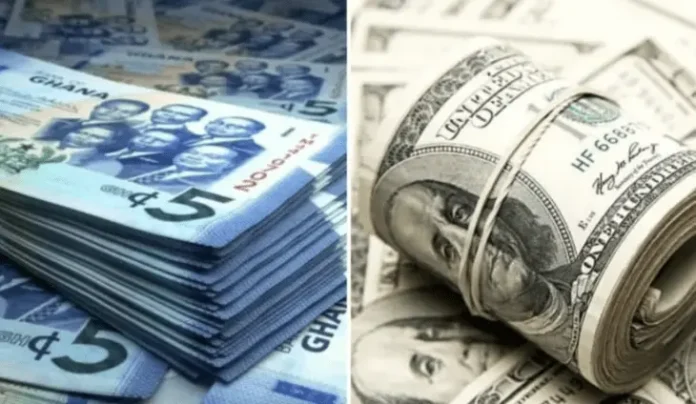University of Ghana Business School Professor Godfred Bokpin has criticized the government’s earlier currency intervention as too aggressive, arguing that the cedi’s recent depreciation was inevitable because initial appreciation lacked foundation in genuine economic transformation.
The economist’s analysis comes as the cedi has weakened to GH¢12.12 against the dollar as of Friday, September 12, 2025, continuing a downward trend that has seen the currency weaken 12.87% over the past month despite being up 24% over the past twelve months.
Speaking on TV3’s Key Points Saturday, Professor Bokpin revealed that the International Monetary Fund had identified excess intervention of $1.4 billion in foreign exchange markets, contradicting earlier government denials about currency manipulation.
“The previous administration had built enough reserves to ensure the appreciation of the cedi, but we were concerned about the pace of appreciation; we felt it was too aggressive,” Bokpin explained, emphasizing that businesses require stability and predictability rather than sharp currency movements in either direction.
The professor’s critique highlights fundamental tensions in Ghana’s exchange rate management, where political pressure for a strong cedi often conflicts with sustainable economic fundamentals. His observation that the appreciation “cannot be traced to economic transformation” suggests underlying structural weaknesses that made depreciation inevitable.
President John Dramani Mahama has responded to the currency pressure by characterizing current movements as an “adjustment” rather than depreciation, assuring that the cedi will settle at a stable rate. Speaking at a Jubilee House media encounter September 10, the president outlined his administration’s approach to currency management.
“We will make sure that any depreciation in the value of the cedi stays within about 5% per annum,” President Mahama stated, setting a specific target for currency stability that analysts are questioning given current market pressures.
The president confirmed that the Bank of Ghana had previously intervened in foreign exchange markets but has now withdrawn from such activities, allowing the currency to find its natural level based on market fundamentals.
However, data shows the dramatic currency journey, with the cedi selling at 15.1244 to the dollar as of January 13, 2025, illustrating the scale of appreciation that Professor Bokpin characterized as unsustainable.
The Bank of Ghana has simultaneously intensified enforcement of foreign exchange regulations, reiterating in an August 27 notice that the Ghana cedi remains the only legal tender for domestic transactions. The central bank specifically prohibited pricing, invoicing, or advertising in foreign currencies for various sectors including education, real estate, and retail.
Enforcement actions have already begun, with the Bank of Ghana suspending United Bank for Africa Ghana’s Foreign Exchange Trading Licence for one month effective September 18, 2025, due to multiple regulatory violations involving unauthorized remittance activities with various payment service providers.
The UBA suspension demonstrates the central bank’s commitment to enforcing foreign exchange regulations while managing broader currency stability challenges. The bank conducted unauthorized partnerships with fintech companies including Halges Financial Technologies, Cellulant Limited, and Flutterwave Inc.
Professor Bokpin’s analysis suggests that Ghana’s focus on exchange rate management may be misplaced, arguing that the country is “too focused on the exchange rate” rather than addressing underlying economic fundamentals that drive currency strength.
The economist’s emphasis on stability over dramatic appreciation aligns with international best practices for exchange rate management, where predictable currency movements facilitate better business planning and investment decisions.
The current currency situation reflects broader challenges in Ghana’s economic management, where short-term political pressures for a strong currency often conflict with sustainable long-term policies based on economic fundamentals.
Skeptics have expressed doubts about the feasibility of President Mahama’s directive to keep depreciation within 5% annually, given current market pressures and the structural challenges identified by Professor Bokpin.
The IMF’s identification of excessive intervention raises questions about Ghana’s adherence to international monetary standards and the sustainability of artificial currency support mechanisms.
As the cedi continues adjusting to market realities, the tension between political expectations for currency stability and economic fundamentals will likely remain a central challenge for Ghana’s monetary authorities.
The broader implications extend beyond exchange rate management to fundamental questions about economic policy credibility and the balance between market forces and government intervention in currency markets.
Source: newsghana.com.gh











